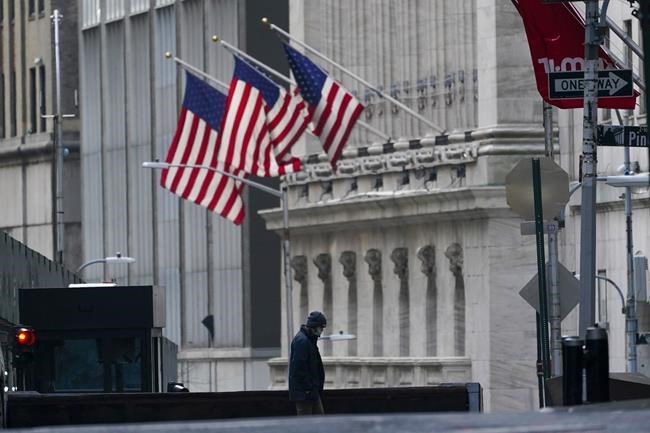NEW YORK (AP) — Wall Street’s rally hit a wall after a surprisingly strong jobs report fueled worries about inflation and higher interest rates. The S&P 500 fell 1% Friday, its first drop in four days, though it took an up-and-down route to get there. The bond market was more decisive in thinking the strong jobs data may push the Federal Reserve to get firmer on high interest rates, which hurt the economy and markets. Treasury yields zoomed higher. Tech stocks also weighed on the market following profit reports that were weaker than expected. The Nasdaq gave back 1.6% and the Dow lost 0.4%.
THIS IS A BREAKING NEWS UPDATE. AP’s earlier story follows below.
NEW YORK (AP) — Wall Street's rally is hitting a wall Friday after a surprisingly strong jobs report fueled worries about inflation and higher interest rates.
The S&P 500 is 1.1% lower and on track for its first drop in four days, though it took an up-and-down route to get there. The bond market was more decisive in thinking the strong jobs data may push the Federal Reserve to get firmer on high interest rates, which hurt the economy and markets.
The Dow Jones Industrial Average was down 155 points, or 0.5%, at 33,898, as of 3:14 p.m. Eastern time, while the Nasdaq composite was 1.6% lower.
The market already looked like it was set to weaken coming into the day, before the jolting jobs report dropped. Late Thursday, several Big Tech companies among Wall Street’s most influential reported weaker profit for the latest quarter than analysts expected.
That cast concerns over a rally that had brought the S&P 500 back to its highest level since August, driven by hopes that cooling inflation may get the Federal Reserve to take a pause soon on its hikes to interest rates and possibly even cut them by late this year.
Then came the jobs report, which showed employers created a net 517,000 jobs last month. That was way above the 185,000 that economists expected and a sharp acceleration from December’s 226,000 jobs.
Normally, a stronger jobs report is good for Wall Street because it means the economy is on firmer footing. But in this upside-down post-COVID world, it could be a worrisome sign. The Fed is in the middle of trying to cool down the job market, in hopes of taking pressure off inflation.
The concern in the market is that the much stronger-than-expected hiring could keep the Fed on the “higher-for-longer” path on interest rates that it’s been talking about, even if markets haven’t been believing it fully.
“It’s going to get harder to argue that rate cuts may be in 2023’s future if the labor market is able to continue like this, especially considering that it remains to be seen how quickly inflation will fall, even if we have reached the peak,” said Mike Loewengart, head of model portfolio construction at Morgan Stanley Global Investment Office.
Treasury yields zoomed higher immediately after the jobs report on forecasts for a firmer Fed. The yield on the two-year Treasury, which tends to track expectations for the Fed, jumped to 4.30% from 4.10% late Thursday. The 10-year yield, which helps sets rates for mortgages and other important loans, rose to 3.53% from 3.40%.
The reaction in the stock market was more hesitant. Stocks opened with sharp losses, erased them all and then fell back later.
Some analysts said they were paying more attention to the data on wages in the jobs report than on overall hiring, which wasn’t as surprising.
Average hourly earnings for workers were 4.4% higher in January than a year earlier. That’s a slowdown from December’s 4.8% raise, though it was a touch above expectations. Slower wage gains can mean less pressure on inflation, though it hurts workers trying to keep up with rising prices at the register.
“The Fed has been downplaying the importance of the unemployment rate and payrolls number, focusing more on wage gains instead,” said Brian Jacobsen, senior investment strategist at Allspring Global Investments. “Wage gains were in line with the consensus expectations, so I’m not as worried as most about the path ahead for the Fed.”
Also helping to muddy the picture was a report showing the U.S. services sector returned to growth in January. It was a much stronger reading than expected, though it also suggested pricing pressures may be easing.
Drops for some Big Tech stocks were weighing on the market following weaker-than-expected earnings reports.
Amazon fell 8.7% and was one of the biggest weight on the S&P 500, while Google's parent company dropped 3.1%. Because they're among the most valuable stocks on Wall Street, their movements carry more weight on the S&P 500 than others.
On the winning side was Clorox, which jumped 8.7% after reporting much stronger profit for the end of 2022 than expected.
Even with Friday's stall, the S&P 500 is still heading for its fourth winning week in the last five. It's also on pace for its first back-to-back weekly gains of at least 1.5% since October.
——
AP Business Writers Yuri Kageyama and Matt Ott contributed.
Stan Choe, The Associated Press

